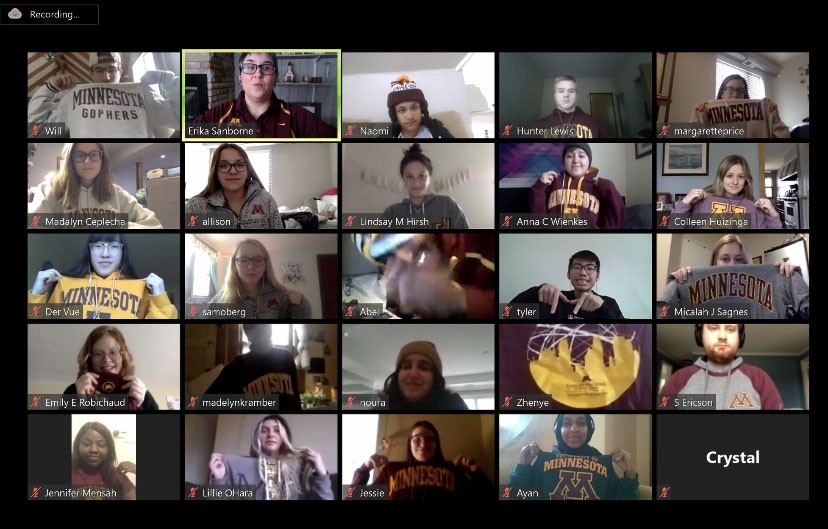Students and faculty on and off the University of Minnesota campus are exploring ways to maintain their mental health during change and transition brought on by the COVID-19 global pandemic.
Classes are completely online, and many students have moved home. Most of the country is practicing social distancing, yet some students at the University are struggling with drastic lifestyle changes and social isolation. However, students and faculty across the University community are coming up with creative ways to combat anxiety and loneliness during COVID-19.
On-campus students: Maintaining connections
After classes transitioned online, sociology T.A. Erika Sanborne said she felt like she would see her students’ lives change and thought of possible ways to bring them together to feel a sense of community.
Sanborne decided to ask her students 15 minutes before their virtual class to wear University gear in hopes students would feel more connected with one another. When class started, she said she was surprised all 25 students wore University apparel.
“Whatever their situations are in the short term right now, to still connect through the video camera in a way that can remind them, you’re not alone in this, we are in this together,” Sanborne said.
Student Senate Chair Amy Ma currently lives alone in Roy Wilkins Hall and said she is adjusting to her new routine during COVID-19.
“I think I didn’t realize I was an extrovert really before this, but it has definitely been hard not having that social connection,” Ma said. “Hopefully next semester, I’ll just really appreciate all the mundane things like just seeing people on the street.”
Off-campus students: New world, new routines
Students off campus are finding their own ways to settle into life back at home, surrounded by new distractions and separated from the community they built at the University.
Some students are taking up new hobbies, having study sessions via Zoom or building new worlds to escape from the current one.
Graphic design major Sarah Lardy was dependent on weekly sessions with a psychiatrist at M Health Fairview after being diagnosed with obsessive compulsive disorder. After moving back to her family’s home in Eagan, Minnesota, she takes advantage of the clinic’s Zoom services to keep up her therapy.
Lardy is also doing things to maintain her well-being like trying new recipes, taking walks with her family and viewing this time at home as a mental respite and time for reflection.
“I think trying to find some semblance of a routine has really been helpful too, just because it’s really hard to transition from a huge, very structured routine to practically nothing,” Lardy said.
Khang Lu, a junior studying mechanical engineering, is connecting to the outside world by recreating it in the popular video game Minecraft.
Alongside other students at the University, Lu explores a virtual version of the University of Minnesota campus, complete with the Walter Library and TCF Bank Stadium.
“It’s more of a personal relaxation method, like doing yoga or something,” Lu said. “You just hop on and take a walk around, since you can’t do it on campus anymore. “
Keep a schedule and keep in touch, experts say
Liza Meredith, a University psychology professor who focuses on college mental health, said keeping a steady schedule is crucial to maintaining mental health.
Matt Hanson, Boynton Mental Health Clinic assistant director, said that staying connected to others is also vital to good mental health, as many students may be experiencing a deep sense of loss of community during social isolation and distancing.
Staying connected may look like keeping up with friends via technology, going outside and taking walks or even getting a pet, Hanson said.
Both Meredith and Hanson emphasized that the anxiety and strain many students are feeling is not something to ignore.
“What I really want people to know is that their emotions are valid, like anything that they’re feeling right now makes sense in the context of this pandemic — something we’ve never experienced before,” Meredith said
How to access U resources
Boynton Mental Health Clinic is still offering services to students in Minnesota via Zoom meetings. While they cannot continue counseling for students outside of Minnesota, Hanson said the clinic is encouraging students to seek care locally.
Boynton Mental Health has also partnered with an online therapy organization called Learn to Live, which is free for students, and provides online care for students experiencing anxiety, depression or substance abuse.
Students who are in crisis, and not in quarantine or self-isolation, may request an in-person appointment at Boynton Mental Health.
Student Counseling Services has also transitioned to online-only appointments.
Additionally, the Student Unions & Activities has virtual programming for information about trivia nights, art explorations, games and competitions, cooking classes and more.








